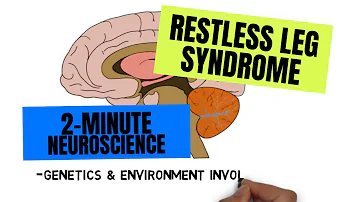Does restless leg syndrome ever go away?
RLS is generally a lifelong condition for which there is no cure. However, current therapies can control the disorder, minimize symptoms, and increase periods of restful sleep.
How long does it take for restless legs syndrome to go away?
These sensations can last for an hour or longer, slowly increasing in severity. While the sensations are most often bilateral, some patients experience them only on one side of the body. The most common time for RLS to occur is at night when the person lies down to sleep.

What triggers restless leg syndrome?
Often, there's no known cause for RLS . Researchers suspect the condition may be caused by an imbalance of the brain chemical dopamine, which sends messages to control muscle movement.
How do you get rid of restless leg syndrome permanently?
Making simple lifestyle changes can help alleviate symptoms of RLS :
- Try baths and massages. Soaking in a warm bath and massaging the legs can relax the muscles.
- Apply warm or cool packs. …
- Establish good sleep hygiene. …
- Exercise. …
- Avoid caffeine. …
- Consider using a foot wrap or a vibrating pad.
What is your body lacking when you have restless legs?
Dopamine. There's evidence to suggest restless legs syndrome is related to a problem with part of the brain called the basal ganglia. The basal ganglia uses a chemical (neurotransmitter) called dopamine to help control muscle activity and movement.
Is restless leg psychological?
Patients suffering from restless legs syndrome have low internal locus of control and poor psychological functioning compared to healthy controls. Neuropsychobiology.
Why wont my restless legs stop?
The cause of restless legs syndrome in most cases is unknown. Research shows that affected people often have too little or malfunctioning iron in the brain. “We also know that there's some problem with the dopamine system, and patients often have a good response to dopamine medicine,” says Allen.
How should you sleep with restless legs?
Slideshow: 16 Remedies for Restless Legs Syndrome
- Sleep Late. 1/16. Restless legs syndrome, also called RLS, makes it hard to sleep. …
- Keep a Regular Bedtime. 2/16. …
- Stretch Before You Sleep. 3/16. …
- Cut the Caffeine. 4/16. …
- Soak in a Warm Bath. 5/16. …
- Chill or Warm Your Legs. 6/16. …
- Make Exercise a Habit. 7/16. …
- Exercise Your Brain. 8/16.
Is Restless Leg Syndrome mental or physical?
The condition is often caused by a combination of mental and physical factors. Women are more likely to be affected with RLS during pregnancy.
What is the most common treatment for restless leg syndrome?
Dopamine agonists: These are most often the first medicines used to treat RLS. These drugs, including pramipexole (Mirapex), rotigotine (Neupro), and ropinirole (Requip), act like the neurotransmitter dopamine in the brain.
What vitamin cures restless legs?
Presence of vitamin D deficiency was significantly associated with presence of RLS (OR =5.085, 95% CI: 1.972–13.113), as was serum vitamin D level (OR =1.047, 95% CI: 1.014–1.082).
What is your brain doing during restless leg syndrome?
If nerve cells become damaged, the amount of dopamine in the brain is reduced, which causes muscle spasms and involuntary movements. Dopamine levels naturally fall towards the end of the day, which may explain why the symptoms of restless legs syndrome are often worse in the evening and during the night.
Does restless leg lead to Parkinson’s?
Does having RLS increase the risk of developing PD? Since RLS affects as much as 4-10% of the US adult population, it is clear that the vast majority of those with RLS do not ever develop PD. Despite this, it still might be the case that RLS increases the risk of subsequently developing PD.
Why do I get restless legs everyday?
Dopamine is involved in controlling muscle movement and may be responsible for the involuntary leg movements associated with restless legs syndrome. In some cases, restless legs syndrome is caused by an underlying health condition, such as iron deficiency anaemia or kidney failure.
What makes restless legs worse at night?
If nerve cells become damaged, the amount of dopamine in the brain is reduced, which causes muscle spasms and involuntary movements. Dopamine levels naturally fall towards the end of the day, which may explain why the symptoms of restless legs syndrome are often worse in the evening and during the night.
What is the most effective treatment for restless legs?
Dopamine agonists: These are most often the first medicines used to treat RLS. These drugs, including pramipexole (Mirapex), rotigotine (Neupro), and ropinirole (Requip), act like the neurotransmitter dopamine in the brain.
Can you live with restless leg syndrome?
Restless legs syndrome is a lifelong condition that might get worse with age. But some people go into remission and don't have symptoms for days to years. Keep your doctor updated on how you're doing. If you start to feel worse, they might suggest different lifestyle changes or medications.
What Vitamin stops restless leg syndrome?
Conclusion: This study indicates that vitamin D supplementation improves the severity of RLS symptoms and advocates that vitamin D deficiency is conceivably associated with RLS.
What makes restless leg syndrome worse?
A number of medications can make RLS worse. In particular, anti-nausea drugs and sedating antihistamines (like Benadryl) block the brain's dopamine receptors, causing restless legs symptoms. Antidepressants that increase serotonin and antipsychotic medications can also aggravate the condition.
What is the best medication for restless legs?
The U.S. Food and Drug Administration (FDA) has approved four drugs for treating RLS:
- ropinirole (Requip)
- pramipexole (Mirapex)
- gabapentin enacarbil (Horizant)
- rotigotine (Neupro)
Is Restless Leg a muscle or nerve problem?
Restless legs syndrome, also known as Willis-Ekbom disease, is a common condition of the nervous system that causes an overwhelming, irresistible urge to move the legs. It can also cause an unpleasant crawling or creeping sensation in the feet, calves and thighs.
How do neurologists treat restless leg syndrome?
The Food and Drug Administration (FDA) has approved ropinirole, pramipexole, gabapentin enacarbil, and rotigotine to treat moderate to severe RLS. Drugs that increase the effect of dopamine (called dopaminergic agents) also have been approved to reduce symptoms of RLS.
Is restless leg syndrome mental or physical?
The condition is often caused by a combination of mental and physical factors. Women are more likely to be affected with RLS during pregnancy.
What is the best thing for restless legs when trying to sleep?
Walk, jog, lift weights, or find any exercise you enjoy. One study found that exercise led to less leg movement and longer and deeper sleep for people with RLS. Be careful not to overdo it. Intense exercise or working out just before bedtime could make your symptoms worse.
What can calm restless legs at night?
During an episode of restless legs syndrome, the following measures may help relieve your symptoms:
- massaging your legs.
- taking a hot bath in the evening.
- applying a hot compress to your leg muscles.
- doing activities that distract your mind, such as reading or watching television.
Is Restless Leg Syndrome nerve damage?
If nerve cells become damaged, the amount of dopamine in the brain is reduced, which causes muscle spasms and involuntary movements. Dopamine levels naturally fall towards the end of the day, which may explain why the symptoms of restless legs syndrome are often worse in the evening and during the night.


